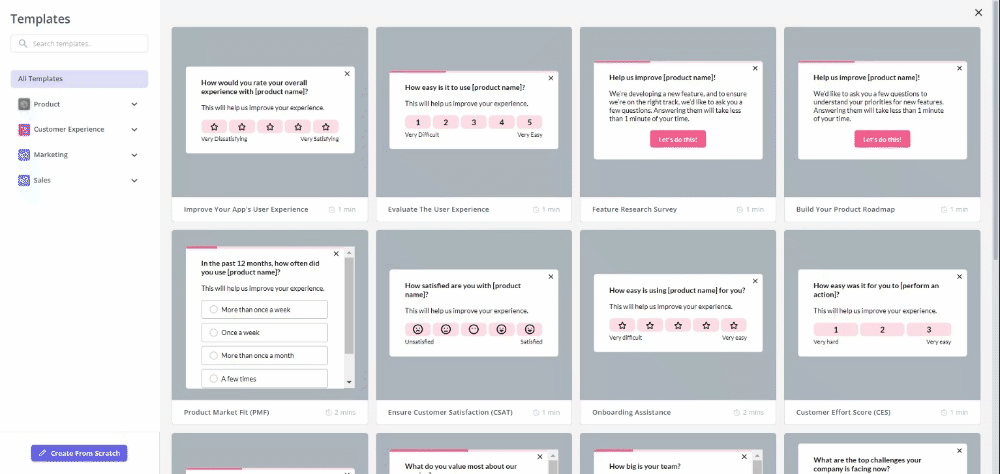
Try Userpilot Now
See Why 1,000+ Teams Choose Userpilot

UX researcher’s main responsibilities
A UX researcher plays a crucial role in understanding user behaviors and needs to inform the design and development of SaaS products.
Here are the main responsibilities and duties of a UX Researcher:
- Conduct User Research: Plan and execute qualitative and quantitative research studies, such as user interviews, surveys, and usability testing.
- Analyze Data: Interpret and synthesize research findings to generate actionable insights and recommendations for product improvements.
- Collaborate with Teams: Work closely with product managers, designers, and developers to integrate research findings into the product development process.
- Create Research Reports: Prepare detailed reports, personas, journey maps, and presentations to effectively communicate insights to stakeholders.
- Advocate for Users: Promote a user-centered design approach within the organization, ensuring user needs and feedback are prioritized.
- Stay Updated: Keep abreast of the latest UX research methods, tools, and industry trends to continuously improve research practices.
- Conduct Competitive Analysis: Analyze competitors’ products to understand market trends and identify opportunities for innovation.
- Facilitate Workshops: Lead workshops and brainstorming sessions to gather input from stakeholders and users.
- Develop Research Plans: Create and manage research plans, timelines, and budgets to ensure projects are completed on schedule.
These responsibilities ensure that UX researchers effectively contribute to the creation of user-centric SaaS products that meet both user and business needs.
UX researcher job description and template
About Us: [Company Name] is a leading provider of innovative SaaS solutions, dedicated to transforming the way businesses operate. We are committed to delivering exceptional user experiences through cutting-edge technology and design.
Role Overview: We are seeking a detail-oriented and experienced UX Researcher to join our team. The ideal candidate will have a strong background in user research methods and a passion for understanding user needs and behaviors. As a UX Researcher, you will work closely with product designers, developers, and stakeholders to gather and analyze user data that informs design decisions and enhances our products’ usability.
Key Responsibilities:
- Conduct User Research: Plan and execute qualitative and quantitative research studies, including user interviews, surveys, and usability testing.
- Analyze Data: Interpret and synthesize research findings to generate actionable insights and recommendations for product improvements.
- Collaborate with Teams: Work closely with product managers, designers, and developers to integrate research findings into the product development process.
- Create Research Reports: Prepare detailed research reports, personas, journey maps, and presentations to communicate insights effectively to stakeholders.
- Advocate for Users: Promote a user-centered design approach within the organization, ensuring that user needs and feedback are prioritized in product decisions.
- Stay Updated: Keep abreast of the latest UX research methods, tools, and industry trends to continually improve research practices.
Qualifications:
- Bachelor’s or Master’s degree in Psychology, Human-Computer Interaction, Design, or a related field.
- 3+ years of experience in UX research or a similar role.
- Proficiency in various research methods and tools (e.g., usability testing, A/B testing, surveys, user interviews).
- Strong analytical and problem-solving skills.
- Excellent communication and presentation skills.
- Ability to work independently and as part of a collaborative team.
Preferred Qualifications:
- Experience in the SaaS industry.
- Knowledge of UX design principles and practices.
- Familiarity with data analysis tools and software.
What We Offer:
- Competitive salary and benefits package.
- Opportunity to work on innovative and impactful projects.
- Collaborative and dynamic work environment.
- Professional growth and development opportunities.
How to Apply: Interested candidates should submit their resume, cover letter, and portfolio to [email address] with the subject line “UX Researcher Application – [Your Name]”.
Best practices to be a great UX researcher
To excel as a UX researcher, it’s essential to adopt practices that enhance your ability to gather meaningful insights and communicate them effectively.
Here are some best practices:
- Empathize with Users: Always strive to understand and share the feelings of users. This helps in designing experiences that truly meet their needs and solve their problems. Conduct thorough user interviews and immerse yourself in the user’s environment whenever possible.
- Communicate Clearly: Present your findings in a way that is easily understandable to stakeholders from different backgrounds. Use visual aids like charts, graphs, and personas to make your data more accessible and engaging.
- Collaborate with Cross-Functional Teams: Work closely with designers, developers, product managers, and other stakeholders. Effective collaboration ensures that research insights are integrated into the product development process and that everyone is aligned with user needs.
- Stay Updated with Industry Trends: UX research is a rapidly evolving field. Stay current with the latest research methods, tools, and industry trends by attending conferences, participating in webinars, and reading relevant literature.
- Iterate Based on Feedback: UX research is an iterative process. Use feedback from users and stakeholders to continuously refine your research methods and insights. This helps you make informed design decisions and improve the user experience.
- Maintain Objectivity: Ensure that your research is unbiased and objective. Avoid leading questions and let the data speak for itself. This helps in building trust with stakeholders and ensuring that design decisions are based on solid evidence.
- Document Your Findings: Keep detailed records of your research processes, findings, and insights. This documentation can be invaluable for future projects and for providing context to new team members.
By following these best practices, you can enhance your effectiveness as a UX researcher and contribute to creating user-centric products that meet both user and business needs.
UX researcher FAQs
- Who can become a UX researcher? Anyone with a background in psychology, human-computer interaction, design, or related fields and a strong interest in understanding user behaviors and improving user experiences can become a UX researcher.
- Do UX researchers get paid well? Yes, UX researchers generally receive competitive salaries, with compensation varying based on experience, location, and industry, often ranging from $60,000 to over $120,000 per year.
- Is it hard to be a UX researcher? Being a UX researcher can be challenging due to the need for strong analytical skills, the ability to conduct and interpret various research methods, and effective communication of findings to stakeholders.
- Do UX researchers need to code? No, UX researchers do not typically need to code, but having a basic understanding of coding can be beneficial for communicating with development teams and understanding technical constraints.
- Do you need a PhD to be a UX researcher? No, a PhD is not required to be a UX researcher. Most positions require a bachelor’s or master’s degree in a relevant field, though higher education can enhance career prospects and earning potential.
Conclusion
We hope this guide has provided you with valuable insights into the roles and responsibilities of UX researchers.
By understanding the key responsibilities and skills required, you can make informed decisions and take meaningful steps in your career or recruitment journey.
Looking into tools for UX researchers? Userpilot is an all-in-one product platform with engagement features and powerful analytics capabilities. Book a demo to see it in action!








